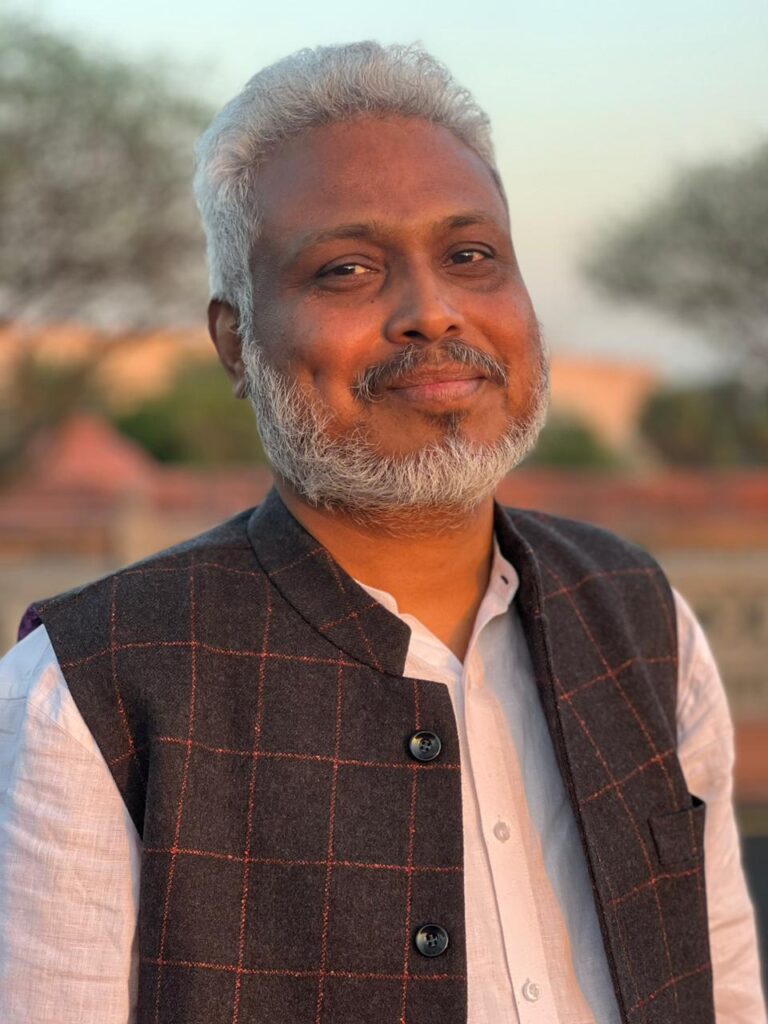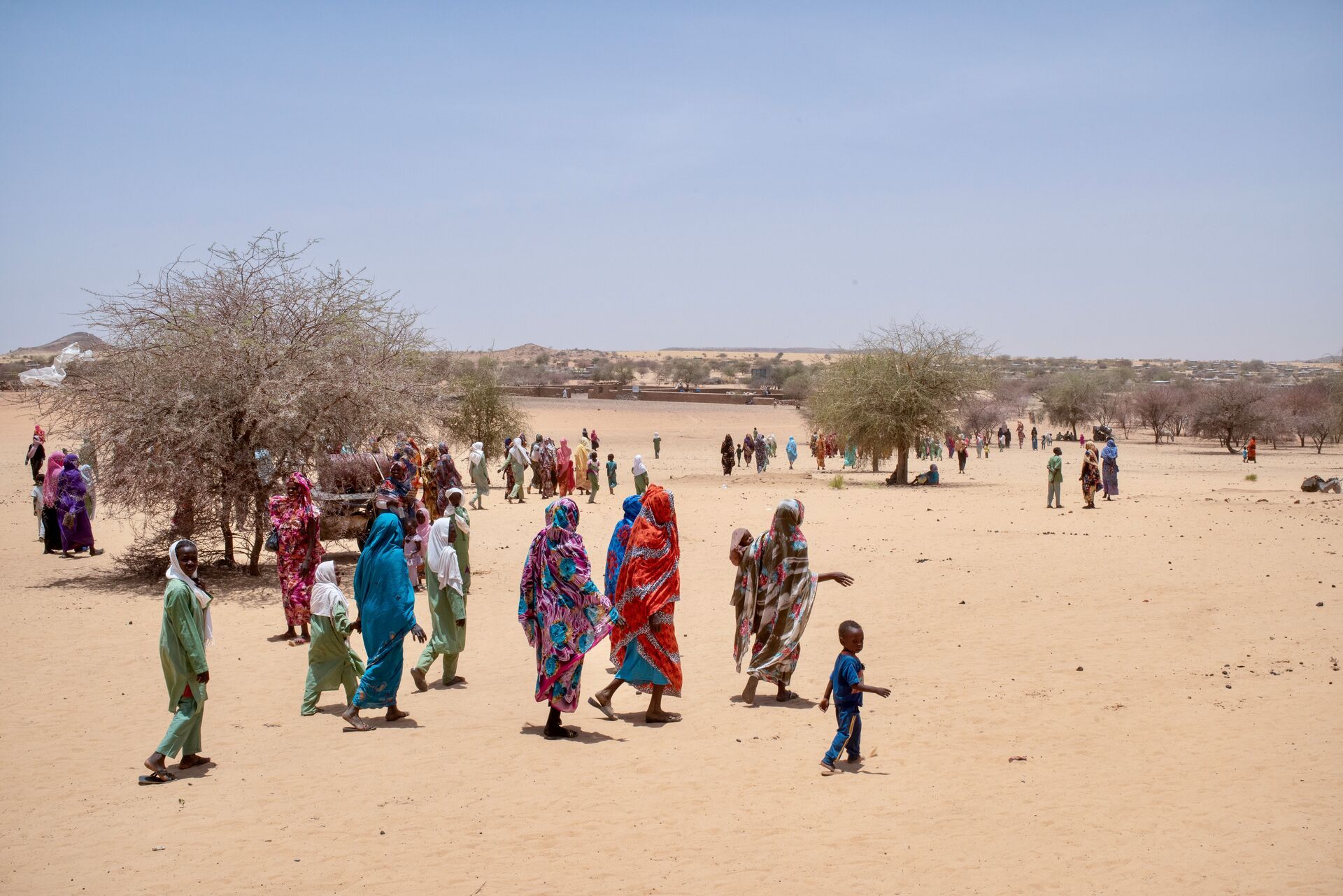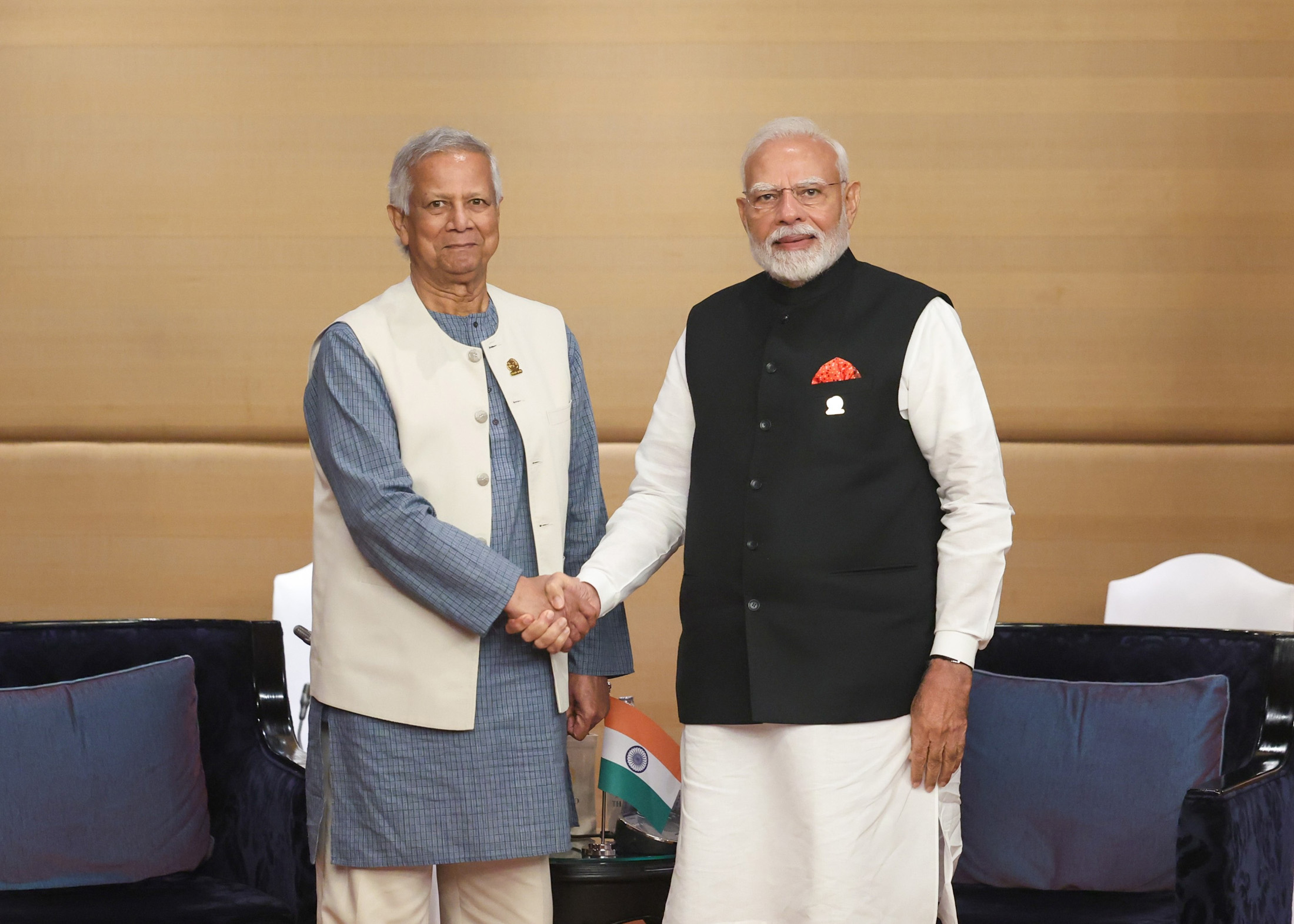
Prime Minister Narendra Modi meeting with the Chief Adviser of the Bangladesh, Professor Muhammad Yunus at Bangkok, in Thailand on April 04, 2025.
Bangkok: Indian Prime Minister Narendra Modi met with Professor Muhammad Yunus, Chief Adviser of Bangladesh’s interim government, today on the sidelines of the 6th Bay of Bengal Initiative for Multi-Sectoral Technical and Economic Cooperation (BIMSTEC) Summit in Bangkok, where he raised concerns over the safety of minorities, particularly Hindus, in Bangladesh.
During his discussions with Yunus, Modi urged the Bangladesh government to take stronger measures to ensure their protection and emphasised the importance of avoiding rhetoric that could harm bilateral relations. He also called for a thorough investigation into reported incidents involving the Hindu community and other minorities in Bangladesh to ensure justice for the victims and restore confidence among these communities.
The Prime Minister also highlighted to Yunus the need for strict enforcement of border laws, particularly in preventing illegal crossings at night, to maintain stability along the India-Bangladesh border. Modi suggested that a bilateral mechanism could be put in place as necessary to address these concerns and ensure a continued focus on border security.
In addition to the border issue, Modi reiterated before Yunus India’s support for a democratic, stable, and inclusive Bangladesh, stressing the importance of safeguarding the rights and security of all communities.
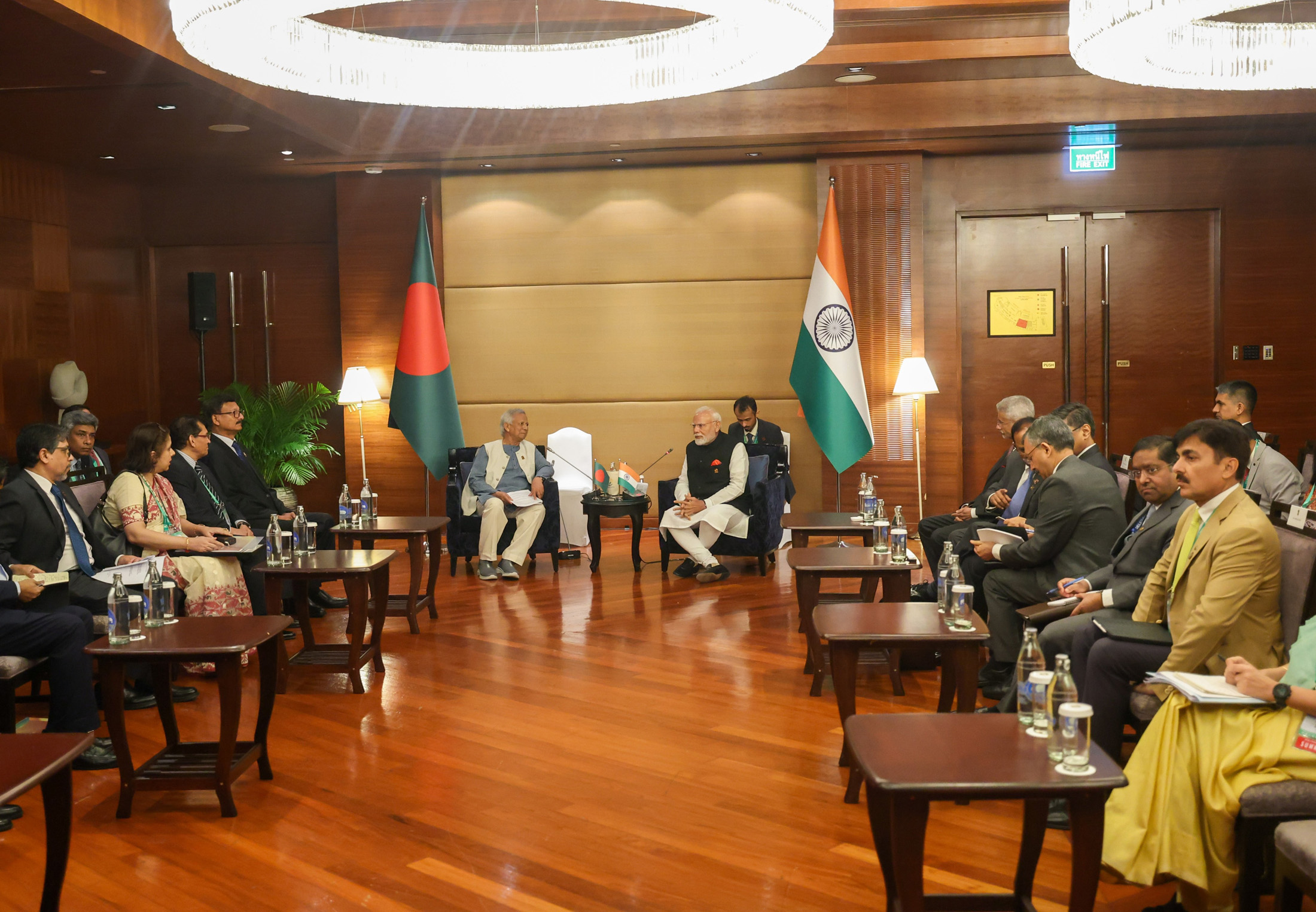
He congratulated Bangladesh on assuming the chairmanship of BIMSTEC and expressed hope that the country would lead the forum in advancing regional cooperation. He noted that Bangladesh’s leadership of BIMSTEC provided an opportunity to further strengthen ties and enhance regional integration through collaborative efforts.
Both Modi and Yunus agreed to continue enhancing consultations on issues of mutual interest. Modi emphasised the people-centric approach to India-Bangladesh relations, underscoring that cooperation between the two countries had already provided tangible benefits to their citizens. He expressed his desire to build on this positive relationship, focused on pragmatism, through constructive discussions.
Modi stresses the need for inclusive elections in Myanmar
Prime Minister Modi also held discussions with General Min Aung Hlaing, Chairman of the State Administration Council and Prime Minister of Myanmar, that centred on the restoration of democracy in Myanmar and India’s ongoing humanitarian efforts following a recent earthquake. Modi stressed the need for inclusive elections in Myanmar and emphasised India’s support for a peaceful, democratic process.

Modi also addressed the ethnic violence in Myanmar, stressing that a military solution would not resolve the conflict and urging the Myanmar government to pursue dialogue for a peaceful resolution. He updated General Hlaing on India’s disaster relief efforts under “Operation Brahma,” including medical aid and support for affected regions. General Hlaing thanked India for its assistance and emphasised the importance of bilateral cooperation on regional challenges, including insurgency and human trafficking.
The two leaders also discussed ongoing infrastructure projects supported by India, with Modi reaffirming India’s commitment to supporting development needs across Myanmar.
The BIMSTEC Summit: Regional Cooperation Focused
At the summit today, Prime Minister Modi presented a 21-point action plan aimed at enhancing cooperation among the BIMSTEC countries. This plan covered a wide range of sectors, including business, IT, disaster management, security, and capacity building. Modi proposed the establishment of a BIMSTEC Chamber of Commerce to strengthen business ties and suggested organising annual BIMSTEC Business Summits to promote trade across the region. He also called for a feasibility study on the possibility of using local currencies for trade between BIMSTEC nations.
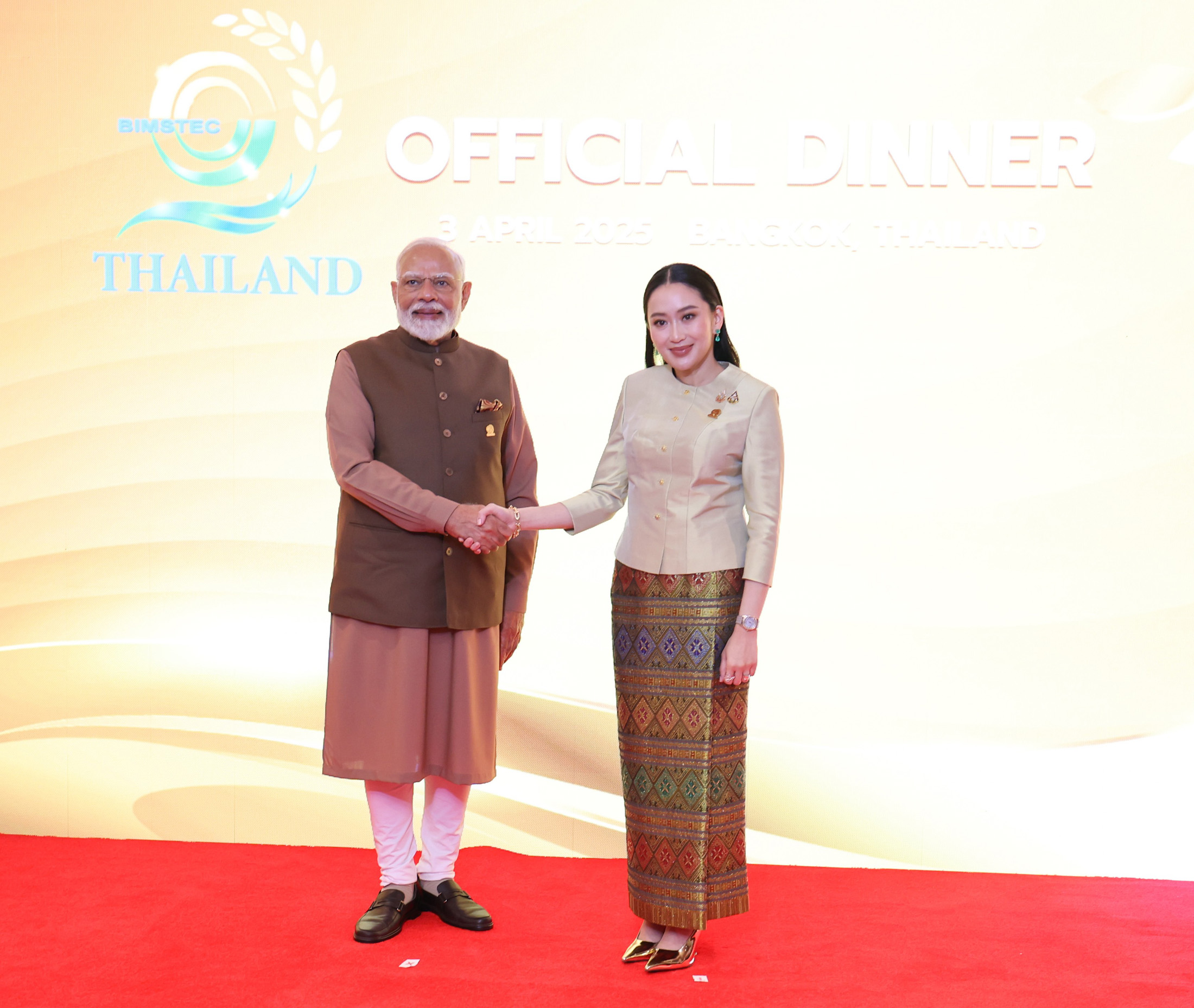
In the field of IT, Modi emphasised the importance of collaboration on Digital Public Infrastructure (DPI) and proposed a pilot study to understand the needs of BIMSTEC countries in this area. He further highlighted the potential for linking UPI and payment systems in the BIMSTEC region to facilitate smoother financial transactions.
On disaster management, the Prime Minister proposed the establishment of a BIMSTEC Centre of Excellence for Disaster Management in India, which would support regional cooperation in disaster relief and rehabilitation. He also announced plans to conduct the fourth joint exercises between BIMSTEC Disaster Management Authorities in India later this year.
Security cooperation was another focal point of the action plan, with Modi urging the first meeting of the BIMSTEC Home Ministers’ Mechanism to be held in India. He also proposed expanding cooperation in space, including setting up ground stations for manpower training and developing nano satellites, as well as utilising remote sensing data for various applications.
In line with India’s focus on capacity building, Modi introduced the “BODHI” initiative – “BIMSTEC for Organised Development of Human Resource Infrastructure.” This initiative aims to train 300 youth annually from BIMSTEC countries in India, with additional scholarships to BIMSTEC students at institutes like the Forestry Research Institute of India and Nalanda University. Modi also announced plans for training young diplomats from BIMSTEC countries and capacity-building programmes in cancer care in collaboration with the Tata Memorial Centre.
The Prime Minister’s action plan also proposed the creation of Centres of Excellence in India for research in traditional medicine and for the exchange of knowledge and best practices to benefit farmers across the BIMSTEC region.
Addressing the energy sector, Modi highlighted the operational start of the BIMSTEC Energy Centre in Bengaluru and called for faster progress on electric grid interconnection to improve energy security across the region. He also proposed the establishment of a Sustainable Maritime Transport Centre in India to enhance coordination and innovation in maritime policies.
The engagement of youth was emphasised through the announcement of a BIMSTEC Young Leaders’ Summit, which will be held this year. Modi also introduced plans for a BIMSTEC Hackathon and a Young Professional Visitors’ programme to foster youth participation and innovation across the region.
Modi also underscored the importance of sports in strengthening ties, announcing the upcoming BIMSTEC Athletics Meet in India and the first BIMSTEC Games to be hosted in 2027. A BIMSTEC Traditional Music Festival will also take place in India later this year, further highlighting the cultural linkages between the nations.
Summit Achievements
The official BIMSTEC statement following the summit highlighted the forum’s significant strides in advancing regional cooperation across various sectors. The summit focused on enhancing connectivity, fostering economic integration, and strengthening collaborative frameworks to address regional challenges. Key outcomes included the launch of initiatives aimed at boosting trade, improving disaster management responses, and enhancing digital infrastructure across member states.
The BIMSTEC leaders also reaffirmed their commitment to strengthening security cooperation, particularly in areas like combating transnational crimes, insurgencies, and human trafficking. The summit underscored the importance of sustainable development and a collective approach to environmental challenges, including cooperation in the fields of energy, maritime transport, and space.
BIMSTEC also placed emphasis on the empowerment of youth, cultural exchanges, and people-to-people connectivity, recognising that the region’s future prosperity relies on the active engagement of its younger generation. The summit concluded with an agreement to hold a BIMSTEC Young Leaders’ Summit later this year and the establishment of new Centres of Excellence in various fields to enhance regional collaboration and capacity building.
The leaders present at the summit included besides Modi, Yunus, and Hllang, were Sher Bahadur Deuba, Prime Minister of Nepal, Lotay Tshering, Prime Minister of Bhutan, Mahinda Rajapaksa, Prime Minister of Sri Lanka, and Prayut Chan-o-cha – Prime Minister of Thailand.
– global bihari bureau


